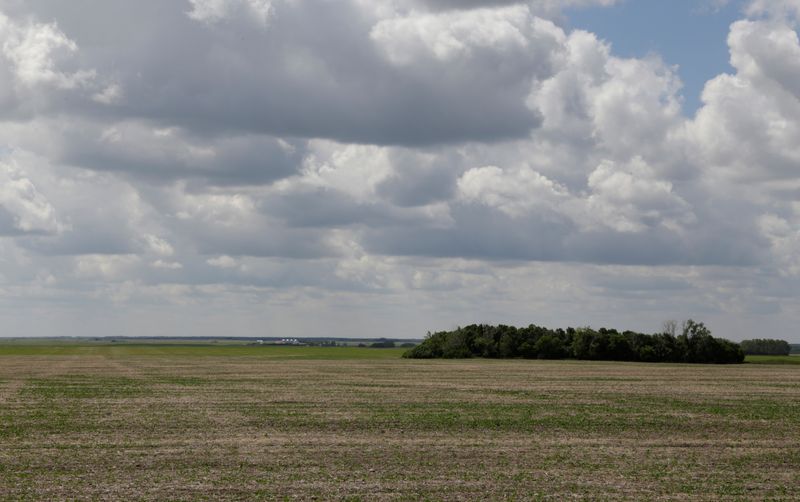By Nia Williams and Rod Nickel
(Reuters) - Canada's abnormally dry winter is worsening drought conditions across the western provinces, where most of the country's oil, gas, forest products and grain are produced.
Western Canada is slowly emerging from a blast of arctic temperatures over the weekend, but the winter had otherwise been unusually mild.
Many cities experienced their warmest December ever recorded and British Columbia's snowpack is on average 44% below normal, according to provincial data. The dry winter follows Canada's hottest summer on record, partly due to the El Nino weather phenomenon, and is raising concerns that 2024 could be another record-breaking wildfire year.
Despite plunging temperatures in recent days, the winter overall is likely to stick to a milder, drier pattern, said Weather Network meteorologist Doug Gillham.
AGRICULTURE
As of Dec. 31, 70% of the country was abnormally dry or in drought, according to Agriculture Canada, with the worst conditions in southern Alberta, western Saskatchewan and north-central British Columbia.
Virtually all of the Prairies have received less precipitation than normal during the past 60 days as of Jan. 8, with large stretches of each province collecting less than 40% of usual precipitation.
In Alberta, three years of drought have raised the cost of feeding cattle and drained dugouts that the cattle drink from. This has forced some farmers to reduce their herds. Canada's cattle inventory hit its lowest level on record in 2022, according to Statistics Canada.
Farms in southern Alberta depend on irrigated river water to sustain crops of potato and sugar beet. Non-irrigated Prairie farms produce most of Canada's wheat and canola, much of which are exported.
OIL AND GAS
Regulators in Alberta and British Columbia, Canada's main oil and gas-producing provinces, have urged companies to cut back on water use because of drought. In December the Alberta Energy Regulator said it may restrict access to water due to extremely low levels in many parts of the province, especially the South Saskatchewan river basin.
Firms are taking steps to manage potential shortages although companies are not changing development plans yet, said Tristan Goodman, CEO of the Explorers and Producers Association of Canada.
Companies that usually take their water from tributaries are looking for larger sources within the same basin, while others are building more permanent and temporary water storage facilities or planning drilling programs to coincide with the peak of the spring snowmelt, Goodman added.
HYDROPOWER
BC Hydro's largest water reservoirs in British Columbia's north and southeast are below normal levels, a spokesperson for the province's electric utility said. BC Hydro imported 10,000 gigawatt hours of electricity in 2023, about one-fifth of its total energy needs, the spokesperson said.
FORESTRY AND WILDFIRES
Alberta still has 60 active wildfires burning and British Columbia more than 100, illustrating the dry and mild state of conditions.
Reduced snowpack means snow will likely melt faster in the spring, prolonging fire season and stretching firefighting resources, said Mike Flannigan, a professor of wildfire science at Thompson Rivers University.
Widespread wildfires could reduce the areas forestry companies are allowed to harvest, while prolonged drought weakens trees by making them more susceptible to disease, he added.
WINTER SPORTS
Western Canada's 92 ski areas typically receive around 9 million skier visits every year, according to the Canada West Ski Areas Association (CWSAA), and the sport contributes C$2 billion ($1.49 billion) a year to British Columbia's economy.
This year a number of ski hills including Red Mountain in Rossland and Big White near Kelowna delayed their opening dates due to warm temperatures and lack of snow.

Conditions are improving but CWSAA CEO Christopher Nicolson said reports from a number of ski hills suggested visitor numbers were lower than usual over the Christmas period.
($1 = 1.3379 Canadian dollars)